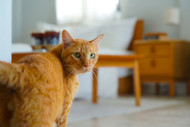Cat Diarrhoea: What to Know and How to Treat It
Posted by Virbac Vet -
Cat diarrhoea refers to stools (faeces) that are loose, runny or watery. It’s a symptom of another health issue, rather than a condition in itself, and it can affect cats of all ages. There can be many causes of diarrhoea in cats, so knowing what to look for and when to take action is essential for your cat’s wellbeing. In this article, we’ll discuss the various causes of diarrhoea in cats, how you can help your cat to feel better, and when to seek advice from your vet.
Causes of diarrhoea in cats
As stools move through the cat’s digestive system, some of their water is absorbed by the body, and they gain consistency. If the stools move too quickly through the intestines, however, not enough water is removed. The final stools become runny and loose, resulting in diarrhoea. This can happen for a number of reasons…
1. Dietary issues - Diet is one of the most common causes of diarrhoea. A cat’s stomach can easily be unsettled by changing food or regularly feeding different foods ,therefore it is best to feed a consistent diet and if you are looking to change diets make sure the transition is gradual over at least a week. Occasionally cats can develop food intolerances or allergies which might require a specific exclusive diet, your vet will be able to advise on the best approach if this is the case. Cat diarrhoea can also be a sign that your cat has ingested something toxic or a foreign body such as non-food items, spoiled food, plants, or toxic household products, if you suspect this is the case you should contact your vet immediately for advice.
2. Worms and infections - When your cat has a viral, bacterial, fungal or parasitic infection, diarrhoea is one of the ways their body may try to get rid of the offending pathogens. Infectious pathogens can also cause diarrhoea by causing irritation, inflammation, or even damage to the gut. Infections can also disrupt the microbiota, the delicate ecosystem of bacteria and other microbes in the gut.
3. Stress - Cats can be susceptible to stress in the household or even a new cat in the neighbourhood, this can result in changes in behaviour and in some cases can present gastrointestinal signs such as diarrhoea. If you feel that your cat is acting differently (hiding away frequently, less willing to go outside or has become more clingy to you) you should discuss options with your Vet to help manage the situation.
4. Chronic illnesses - Systemic illnesses can affect the function of the digestive system and lead to cat diarrhoea. These can include illnesses that directly affect the gut, like inflammatory bowel disease, or illnesses that affect other organ systems, like kidney disease, liver disease or hyperthyroidism.
Signs of cat diarrhoea and when to call or go to the vet
The most obvious sign of cat diarrhoea is loose, runny or even watery stools, but if they toilet outside this can be difficult to spot. Your cat might go to the toilet more frequently, or ask to go outside more often, you might also notice they are cleaning their bottom more. Diarrhoea may also be accompanied by vomiting or general loss of appetite.
Cat diarrhoea is often mild and resolves by itself within 24 hours. However, it can sometimes be a sign of a serious illness that needs attention. Furthermore, severe or persistent diarrhoea can lead to malnutrition, dehydration and electrolyte/mineral imbalances. Contact your vet right away if your cat is showing any of the following signs of dehydration:
- Little or no urination
- Dark urine
- Dry/tacky gums
- Sunken eyes
- Panting
- Elevated heart rate
- Loss of appetite
- Lethargy
- Skin tenting. Gently pinch and lift the skin between the shoulder blades; skin that stays ‘tented’ when you let go is a sign of dehydration.
Urgently take your cat to your vet if you see any of these serious signs:
- Severe diarrhoea or vomiting
- Diarrhoea that lasts longer than 24 hours
- Bloody stools
- Weight loss with no obvious cause
- Weakness or lethargy
- Fever
 How is cat diarrhoea treated?
How is cat diarrhoea treated?
If your cat is experiencing mild diarrhoea there are steps you can take at home to help:
Hydration. Restore lost fluids by making sure your cat has plenty of fresh water available.
Switch to a highly digestible digestive support diet specifically tailored to support digestive health.
Monitor your cat's symptoms and demeanour carefully, if they seem quiet or have any other symptoms such as vomiting, or blood in the faeces you should call your vet.
If the diarrhoea remains mild and resolves within 24 hours you might be able to manage it at home,if it hasn’t resolved within 24 hours at home or your cat is unwell, it would be advised to get your cat checked at the vets. To determine the best treatment plan for your cat and to try to establish a cause the vet might ask you for a brief history.
Depending on what they find, they might recommend:
- Probiotics to restore a healthy gut microbiome.
- Blood tests.
- Diagnostic tests such as ultrasound.
- IV (intravenous) fluids to replenish lost fluids and electrolytes
- A specially formulated food to help manage digestive issues or as a recovery diet, for example: VETERINARY HPM Cat Digestive Support G1 wet food.
- If food allergies or intolerances is suspected they might suggest an elimination trial using a diet containing hydrolysed proteins (that are not detected by your cats digestive system), an example would be VETERINARY HPM Cat Hypoallergy A2 which might be suggested for a short term trial or recommended for long term use in some cases.
Preventing cat diarrhoea
- Stick to a consistent feeding schedule and try to avoid any sudden changes in diet
- If you are going to change your cats diet, introduce dietary changes gradually and monitor your cat’s reaction
- Avoid feeding them table scraps/ human food
- Protect your cat from parasitic infections like roundworm with regular deworming and parasite prevention treatments
- Keep your cat’s environment as stress-free and consistent as possible
- Visit the vet for regular check-ups so that any health problems can be caught and addressed early
FAQs
What should I feed my cat if they have diarrhoea?
Switch to a digestive support food which contains highly digestible ingredients to aid recovery. Splitting the food into little and often meals around 4-6 times a day can help to avoid overloading the stomach and avoid feeding any treats or rich foods that might make the symptoms worse.
How long can cat diarrhoea last?
Depending on the cause of the diarrhoea, acute mild cases can resolve within a couple of days but if it persists or returns frequently it would require further investigation. To help identify a cause of the diarrhoea or any triggers, it would be advisable to note down when the diarrhoea started and any changes to routine or diet.
Can I give human diarrhoea medication to my cat?
Human medications might not be suitable for pets and could do more harm so it is best to discuss with your vet prior to giving any over the counter products. Cat probiotics might be useful in cases of acute diarrhoea but it is best to get specific advice for your cat before using any medicines.
If in doubt, ask your vet!
Most cats will have the occasional bout of diarrhoea that resolves by itself, but for some cats, it can be a sign of a problem that needs attention. By being vigilant about your cat’s digestive health, you can quickly spot when something isn’t right and judge when to seek professional advice. Your vet can help you determine the cause of your cat’s diarrhoea and devise the best treatment plan for your feline friend.


